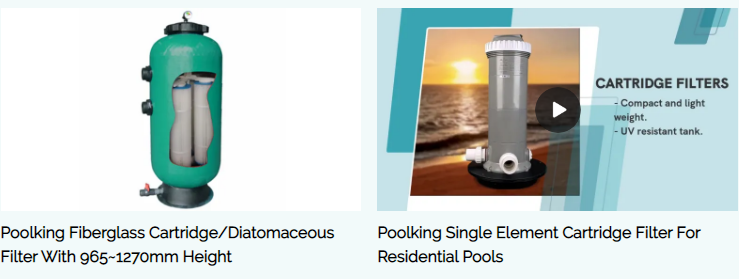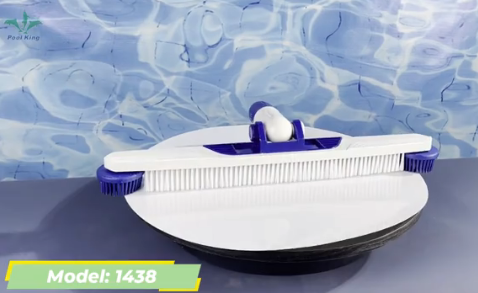A swimming pool is exposed to multiple contaminants which puts the health of swimmers at risk. To keep it safe and clean for users, you need a reliable filtration system. A pool filtration system is designed to keep the water free from debris, contaminants and algae. If you have already installed a swimming pool filter, you can improve its filtration by following our tried and tested tips.
Poolking, your best swimming pool equipment manufacturer and supplier with more than 20 years experience. ![]() Email: sandy@poolking.co
Email: sandy@poolking.co
8 Ways To Improve Your Swimming Pool Filtration
Drawbacks of Continuing with Poor Filtration
Before going over how to improve pool filtration, let's first look at what happens when you ignore poor filtration in your swimming pool. Letting it go can cause several frustrating and costly problems. Here are some of the drawbacks you might face:
Algae Growth
Inadequate filtration allows algae to thrive. Algae are those greenish or slimy growths you sometimes see in pools. They not only make your pool look bad but can also make it unsafe for swimming. Moreover, algae can make your pool slippery and cause health problems.
Increased Chemical Use
When your pool filtration isn't up to par, you will need to use more pool chemicals like chlorine to keep the water clean. This can be costly and may irritate your skin and eyes if you overdo it with chemicals.
Clogged Equipment
Poor filtration can lead to clogged pipes and equipment like pool filters and pumps. And fixing or replacing these can be expensive and cause more hassle than just maintaining your filtration system.
Shortened Equipment Life
The stress of dealing with unclean water and clogged filters can cause your pool equipment to wear out faster. Consequently, you will have to replace pumps, filters or other parts which can be a significant expense.
Health Risks
Perhaps the most crucial drawback of poor filtration is health risks. Bacteria and other germs can multiply in a pool with subpar filtration, making it unsafe to swim in. This can lead to illnesses and infections, especially for children.
8 Ways to Improve Pool Filtration
Now, let’s focus on our main topic, the best ways to improve your pool water filtration.
1. Choose the Right Swimming Pool Filter Type
Selecting the right pool filter for your pool is the first step toward better filtration. You have three main options: sand, cartridge and diatomaceous earth (DE filter). Each swimming pool filter has pros and cons. Pool sand filters are low maintenance but may not provide the finest filtration. A cartridge filters offers better filtration and easy cleaning, while the DE pool filter provides the highest filtration but demand more maintenance. Choose the one that suits your pool's size and your maintenance preferences.

If you are looking for a filtration system, check Pool King's range of filter systems. We have all three types of filters suitable for your pool.
2. Correct Filter Sizing
To ensure effective filtration, it is critical to match the filter's size to your pool's volume and flow rate. Poor filtering will result from a filter that can't keep up because it is too small. Although a larger filter may save energy, it won’t function properly either. Consult a pool specialist to establish the appropriate filter size for your pool.
You can also do the math yourself by using the equation used to calculate filter sizes: pool capacity in gallons divided by the desired turnover rate in hours. By doing this, you will get the required minimum flow in gal/m (gallons per minute). To find the gal/m, divide this number by 60.
3. Maintain a Consistent Water Level
A steady water level is critical for the efficacy of your filtering system. When the water level is too low, air may be introduced into the system, lowering its efficiency. A high water level, on the other hand, can overflow the skimmer and reduce water circulation.
The water level should ideally be near the midpoint of the skimmer hatch, which is located on the pool's side. It is advised that the water level in your pool be between one-third and one-half up the aperture of the pool skimmer box.
4. Regularly Clean the Filter
Cleaning your pool filter is essential for maintaining optimal filtration. How often you clean it depends on your filter type and pool usage. Generally, clean a cartridge filter when the pressure gauge rises by 8-10 psi and backwash a pool sand filter when the pressure increases by 25% above the clean pressure. DE pool filters need regular cleaning through backwashing and recharging.
You can also ask your service provider to guide you to follow the manufacturer's instructions for proper maintenance.
5. Skim and Brush Your Pool
To reduce the load on your pool filter and boost its efficiency, regularly skim the pool's surface to remove leaves, debris and insects. Additionally, brushing the pool walls and floor helps dislodge algae and dirt that could clog the filter. This proactive approach can extend your filter's lifespan and maintain crystal-clear water.
Did you know? Pools have their own specifically designed brushes for cleaning. If you are looking for a good one, order a Durable Large Plastic Pool Brush from Pool King!

6. Use a Pool Cover
Investing in a pool cover is a smart move for pool owners seeking improved filtration. Covers prevent debris, leaves and contaminants from entering the pool, reducing the strain on your filtration system. They also help conserve water and reduce chemical usage by preventing evaporation.
7. Check and Balance Water Chemistry
Proper water chemistry is critical for your filter's effectiveness. Regularly test and adjust the pH, chlorine and alkalinity levels. Balanced water chemistry not only ensures better filtration but also prevents algae and bacteria growth that can clog the filter and cloud the water.
8. Upgrade to Variable Speed Pump
If you are using an older single-speed pool pump, consider upgrading to a variable-speed pump. Variable-speed pool pumps are more energy-efficient and can be adjusted to run at lower speeds for regular filtration and higher speeds for tasks like vacuuming and water features. This not only saves on energy bills but also extends your filtration system's life.
Conclusion
Improving your swimming pool filtration doesn't have to be complicated. By selecting the right swimming filter, maintaining it properly and adopting good pool maintenance practices, you can enjoy a cleaner, clearer and more inviting pool.
Related articles
Common Problems and Fixes for Pool Sand Filters You Need to Know About
How to Pick the Right Sand Filter for Your Pool?
How Does a Swimming Sand Filter Work? A Complete Guide.

PRODUCTS
Contact: Sandy
Email: sandy@poolking.co
Sales Hot line: +86-20-34982303
WhatsApp:+86-13922334815
Add: No. 80, Danan North Road, Dagang Village, Dagang Town, Nansha District, Guangzhou City (temporary business premises)


























